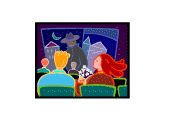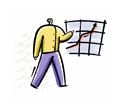Usa-se GOING TO:
- quando se tem certeza do que vai acontecer, uma decisão já tomada.
Situação 1
- What color are you going to paint your kitchen? (Que cor você vai pintar sua cozinha?)
- I´m going to paint it white. (Vou pintá-la de branco.)
Situação 2
- What are you going to do after class tonight? (O que você vai fazer após a aula hoje à noite?)
- I´m going to stop by at my uncle´s house to pick up some books. (Vou passar na casa do meu tio para pegar alguns livros.)
- para se fazer previsões sobre o que vai acontecer.
I think the concert is going to be good. (Acho que o show vai ser bom.)
I think it´s going to rain. (Acho que vai chover.)
Usa-se WILL:
- com expressões como “I THINK”, “MAYBE”, “I´M SURE”.
I think you´ll do well on the test. (Acho que você irá bem na prova.)
Maybe I´ll go to the movies tonight. (Talvez eu vá ao cinema hoje à noite.)
I´m sure everything will be all right. (Tenho certeza de que tudo ficará bem.)
- para se oferecer a fazer algo.
The phone´s ringing! (O telefone está tocando.)
Don´t worry, I´ll get it. (Não se preocupe, eu atendo.)
- quando se resolve fazer algo na hora da fala.
- Sir, will you have red wine or white wine? (O senhor aceita vinho tinto ou branco?)
- Mmm, I´ll have red wine. (Mmm, aceito o vinho tinto.)
Well, I hope this tip will help you. If you have any doubts or questions, post your comments here and I’ll answer them ASAP (as soon as possible)!
Take care and hope to hear from you soon!
Exercício--Escolha as opções(frases) que melhor substituem as que estão no futuro simples(will):
1.I will talk to her in private.
a.I going to talk to her in private.
b.I´m going talk to her in private.
c.I´m going to talk to her in private.
2.You will have better friends.
a.You´re going to have better friends.
b.You going to have better friends.
c.You´re going have better friends.
3.He won´t let it happen.
a.He is going to let it happen.
b.He´s not going to let it happen.
c.He not going to let it happen.
4.Will she take a test?
a.Is she going to take a test?
b.She going to take a test?
c.Is she going take a test?
5.It will make your dream come true.
a.It going to make your dream come true.
b.It´s going to make your dream come true.
c.It´s not going to make your dream come true.
6.They will tell you what to do.
a.They´re going to tell you what to do.
b.They is going to tell you what to do.
c.They´re going tell you what to do.
7.Flamengo will win.
a.Flamengo is goin to win.
b.Flamengo going to win.
c.Flamengo is going to win.
retirei daqui
I want to understand as if it were my mother language, I want to speak fluently and accurately, write without spelling mistakes, I want to paste the grammar in my skin, I want to go to the movies and can watch the movie without reading the caption. Long live the English language! So, the purpose of this blog is to train it all. Come on!
segunda-feira, 22 de agosto de 2011
Irregular Verbs - Exercises
1) Qual o passado dos verbos irregulares abaixo?
*Dream tem duas formas, uma regular e outra irregular. Quais são elas?
A) Hit : Hit
B) Beat : Beat
C) Cut : Cut
D) Put : Put
E) Hurt : Hurt
F) Let : Let
G) Set : Set
Dream : Dreamed/Dreamt
retirei daqui
retirei daqui
*Dream tem duas formas, uma regular e outra irregular. Quais são elas?
A) Hit : Hit
B) Beat : Beat
C) Cut : Cut
D) Put : Put
E) Hurt : Hurt
F) Let : Let
G) Set : Set
Dream : Dreamed/Dreamt
retirei daqui
| 2) | Will the concert be broadcast live? (broadcast = transmitido) | |
| | ||
| A. | broadcaught | |
| B. | broadcasted | |
| C. | broadcast (correct answer) | |
| D. | broadcastted | |
| Explanation Will the concert be broadcast live? - O concerto/show será transmitido ao vivo? O verbo broadcast (transmitir) permanece igual no passado e no particípio: broadcast - broadcast - broadcast. | ||
| 3) | Who babysat for you yesterday? (babysit = toma conta das crianças) | |
| A. | babysited | |
| B. | babyset | |
| C. | babyseat | |
| D. | babysat (correct answer) | |
| Explanation Who babysat for you yesterday? - Quem tomou conta das *crianças para você ontem? Babysit - babysat - babysat. Babysit fica babysat no passado simples e no particípio passado. * pode ser filho/filha dependendo do contexto. | ||
| 4) | How much money have you withdrawn today? (withdraw = retirar) | |
| A. | withdrawed | |
| B. | withdrawn (correct answer) | |
| C. | withdraw | |
| D. | withdrown | |
| Explanation How much money have you withdrawn today? - Quanto dinheiro você retirou hoje? Withdraw - withdrew - withdrawn. Usamos withdrawn (particípio) na frase acima, pois ela usa o presente perfeito. | ||
| 5) | I could have sworn that I heard someone call my name. (swear = jurar) | |
| A. | sworn (correct answer) | |
| B. | sworm | |
| C. | swaer | |
| D. | sweared | |
| Explanation I could have sworn that I heard someone call my name. - Eu poderia ter jurado que ouvi alguém chamar meu nome. Swear - swore - sworn. O verbo swear (jurar, nesse caso - também xingar) muda nas três formas. | ||
| 6) | I was stung on the neck by a bee. (sting = picada) | |
| A. | steng | |
| B. | stinged | |
| C. | stong | |
| D. | stung (correct answer) | |
| Explanation I was stung on the neck by a bee. - Eu fui picado no pescoço por uma abelha. O verbo sting fica stung no passado simples e particípio passado. Sting - stung - stung. | ||
| 7) | Have you wrung out your clothes yet? (wring = torcer) | |
| A. | wreng | |
| B. | wrang | |
| C. | wrung (correct answer) | |
| D. | wringed | |
| Explanation Have you wrung out your clothes yet? - Você já torceu suas roupas? O verbo wring fica wrung no passado simples e particípio passado. Wring - wrung - wrung. | ||
| 8) | I haven't sought specialized help yet. (seek = procurar) | |
| A. | seak | |
| B. | saught | |
| C. | sought (your answer) | |
| D. | seeked | |
| Explanation I haven’t sought specialized help yet. - Eu ainda não procurei por ajuda especializada. O verbo seek fica sought no passado simples e particípio passado. Seek - sought - sought. | ||
| 9) | I’ve always striven to do my best. (strive = tentar)) | |
| A. | straven | |
| B. | stroved | |
| C. | streaven | |
| D. | striven (correct answer) | |
| Explanation I’ve always striven to do my best. - Eu sempre tentei ao máximo fazer o meu melhor. O verbo strive, que expressa a idéia de se esforçar ao máximo para fazer/conseguir algo, muda nas três formas. Strive – strove – striven. Strive também pode ser usado como verbo regular, ou seja, strive - strived - strived. | ||
retirei daqui
Active voice, Passive voice - Exercises
Este assunto é muitas vezes tratado como bicho de sete cabeças, mas a verdade é que pode ser bem simples. Vejam:
Charles wrote the email. (Ativa) >> Charles escreveu o email.
The email was written by Charles. (Passiva.) >> O email foi escrito por Charles.
The news shocked us. (Ativa) >> As notícias nos chocaram.
We were shocked by the news. (Passiva) >> Ficamos chocados pelas notícias.
The president will visit them. (Ativa) >> O presidente vai visitar eles.They will be visited by the president. (Passiva) >> Eles serão visitados pelo presidente.
They have fired her. (Ativa) >> Eles a demitiram.
She´s been fired. (Passiva) >> Ela foi demitida.
*Duas características importantes da voz passiva:
1) A presença do verbo "to be": Am, is, are, was, were, been, etc.
2) A preposição "by".
#Com base nas explicações acima coloque as frases a seguir na voz passiva.
a) Jane painted the picture.
R:..The picture was painted by Jane.
b) The rain scared us.
R:...We were scared by the rain.
c) The school will hire him.
R:...He will be hired by the school.
d) They have selected him.
R:...He has been selected/He´s been selected.
Retirei daqui
Charles wrote the email. (Ativa) >> Charles escreveu o email.
The email was written by Charles. (Passiva.) >> O email foi escrito por Charles.
The news shocked us. (Ativa) >> As notícias nos chocaram.
We were shocked by the news. (Passiva) >> Ficamos chocados pelas notícias.
The president will visit them. (Ativa) >> O presidente vai visitar eles.They will be visited by the president. (Passiva) >> Eles serão visitados pelo presidente.
They have fired her. (Ativa) >> Eles a demitiram.
She´s been fired. (Passiva) >> Ela foi demitida.
*Duas características importantes da voz passiva:
1) A presença do verbo "to be": Am, is, are, was, were, been, etc.
2) A preposição "by".
#Com base nas explicações acima coloque as frases a seguir na voz passiva.
a) Jane painted the picture.
R:..The picture was painted by Jane.
b) The rain scared us.
R:...We were scared by the rain.
c) The school will hire him.
R:...He will be hired by the school.
d) They have selected him.
R:...He has been selected/He´s been selected.
Retirei daqui
Present Simple - Exercises
Preencha os espaços em branco com a forma adequada do verbo destacado - Tempo verbal: Presente simples
A)John lives with his parents in a country town.(Live)
B)That guy has a lot of important information.(Have)
C)Our great grandfather gets a pension.(Get)
D)She knows English well but her brother hates it.(Know/hate)
E)Ronaldo scores goals when he´s in good shape.(Score)
F)We lose control of our lives due to bad habits.(Lose)
G)Mary and Anna go to college in the evening.(Go)
A)John lives with his parents in a country town.(Live)
B)That guy has a lot of important information.(Have)
C)Our great grandfather gets a pension.(Get)
D)She knows English well but her brother hates it.(Know/hate)
E)Ronaldo scores goals when he´s in good shape.(Score)
F)We lose control of our lives due to bad habits.(Lose)
G)Mary and Anna go to college in the evening.(Go)
Assinar:
Postagens (Atom)